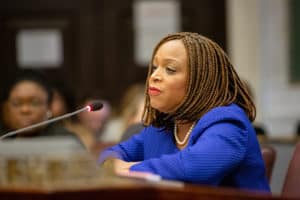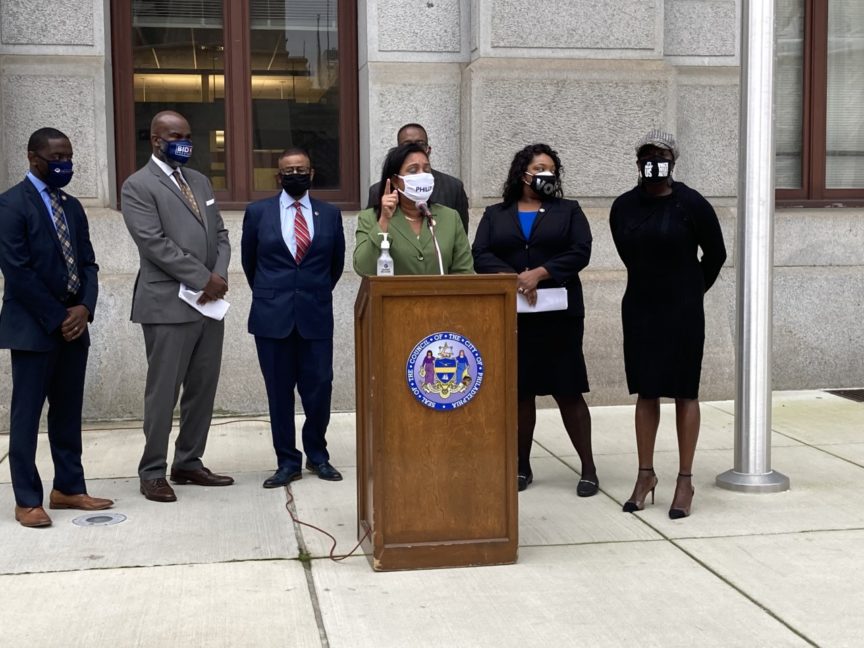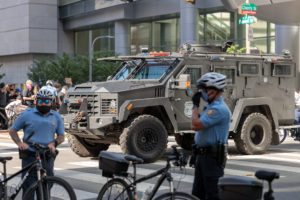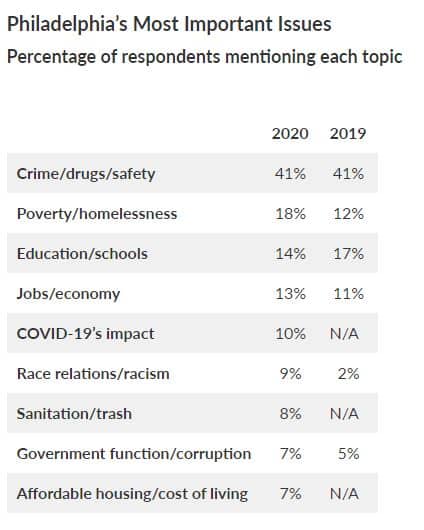FATAL SHOOTING OF WALTER WALLACE, JR. BY POLICE SPURS MORE COUNCIL ACTION ON POLICE REFORM
A brief, deadly encounter on a Monday afternoon – the killing of a 27-year-old black man in the grip of a mental health crisis by Philadelphia police officers – drew Philadelphia back into a firestorm of protest, demonstrations, and looting this week, and spurred City Council to act on a number of fronts on police reform.
On Wednesday, two days after Walter Wallace, Jr. was shot and killed by city police as he wielded a knife on a West Philadelphia street, seven Council members stood outside City Hall to outline what Council has done on the topic of police reform, and to point the way towards further reforms.
Councilmember Curtis Jones, Jr. (4th District) highlighted the question on Tuesday’s ballot for voters to consider: Should the city create a new civilian-led Citizens Police Oversight Commission with real enforcement powers? “The question is, who polices the police?” Jones said at the Wednesday news conference. “The answer is, We the People should.”
Councilmember Maria Quiñones Sánchez (7th District) detailed another ballot question to be voted Tuesday, the creation of an Office of Victim Advocate to advocate for victims of serious crimes. Quiñones Sánchez first described the pain she felt, as a mother to a young son, seeing Wallace’s mother keening in pain moments after her son was shot by police.
Council Majority Leader Cherelle Parker (9th District) described a third ballot question, asking voters their views on the controversial police tactic of stop-and-frisk. Parker also highlighted a new residency requirement law, requiring that all new hires by police and other city agencies be residents of Philadelphia for one year prior to hiring – to make the police force look more like the population it serves.
Councilmember Katherine Gilmore Richardson (At Large) explained the purpose beneath a new city ordinance requiring a public hearing before any changes to the city’s contract with its police union. “To foster transparency and accountability where it did not exist before,” Gilmore Richardson said.
Councilmember Isaiah Thomas (At Large) noted the “Let Philly Breathe” law that bans the use of chokeholds by law enforcement as a matter of city law. The chokeholds bill and the office of victim advocate ballot question were both authored by Councilmember Kenyatta Johnson (2nd District).
Councilmember Derek Green (At Large), the father of a son on the autism spectrum, explained the pain he felt as a father upon learning of Mr. Wallace’s fatal encounter with police while in the middle of a mental health crisis. Green said it was critical that Council revisit the issue of requiring more mental health workers to be deployed by police on calls involving mental health issues – an issue Council flagged in June during the budget process.
Council spoke collectively after two nights of civil unrest, as well as looting in multiple neighborhoods across the city. Council President Darrell L. Clarke (5th District) gave voice to his colleagues’ frustration with the looting, and issued a call for calm.
“We are encouraging as strongly as possible for our citizens — please do not trash our own communities,” Clarke said. “There are so many people who work in those stores, so many people who depend on these stores, the vibrancy of our neighborhoods, we’re concerned that some of these stores, if they close a second time – they’re not coming back. So please, let the investigations take place by the District Attorney and the police. Please be calm, let the process work, as expeditiously as possible.”
Later that day, Mayor Jim Kenney instituted a citywide curfew from 9 pm until 6 am. Wednesday night, the city remained relatively calm.
COUNCIL APPROVES BILL REQUIRING POLICE TO HAVE A POLICY BANNING USE OF TEAR GAS, RUBBER BULLETS DURING FIRST AMENDMENT PROTESTS
After George Floyd’s violent death at the hands of Minnesota police, protests broke out across the country, including here in Philadelphia. Two episodes, one in West Philadelphia, one in Center City, led police to use tear gas to disperse the protests. Those widely-criticized tactics led Councilmember Helen Gym (At Large) to introduce legislation requiring the police force to set a policy banning the use of tear gas or rubber bullets during protests involving First Amendment activities.
That legislation passed Council Thursday by a 14-3 vote, with members Brian O’Neill (10th District) and David Oh (At Large) joining Bobby Henon (6th District) in voting against the bill. It also prompted spirited debate in Council’s virtual meeting before the bill passed.
Councilmember Gym outlined the testimony of many protestors who testified to their experiences with Philadelphia police during the June protests. “Their words and their pain are the foundations of this bill,” Gym told her colleagues.
Councilmember Oh disagreed strongly with the bill’s premise – that city police needed to be regulated to prevent their use of less-than-lethal tactics such as tear gas.
Councilmember Green, who voted in favor of the bill, nevertheless elicited comment from his colleague, Councilmember Gym, that aside from the June incidents, the most recent time Philadelphia police used tear gas during a political or First Amendment-protected protest was the 2000 Republican National Convention – two decades ago.
COUNCILMEMBERS BASS AND JONES CALL ON CITY TO INCREASE ACCESS TO MENTAL HEALTH CARE IN TANDEM WITH POLICE RESPONSE CALLS
On Monday, the family of Walter Wallace, Jr. called police several times, seeking help as Mr. Wallace went through some kind of mental health break. Instead, when police came the final time, it ended tragically, as Wallace wielded a knife on a city street, and police shot and killed him. Thursday, two Councilmembers said they planned to hold hearings to investigate why the city doesn’t do a better job coordinating mental health services and police responses to situations involving mentally ill individuals.
Councilmember Jones, who chairs Council’s Committee on Public Safety, introduced a resolution calling on Philadelphia police and the city’s Department of Behavioral Health to increase reliance on trained mental health providers when responding to 911 calls – to better identify when individuals are experiencing mental distress.
Councilmember Cindy Bass (8th District), who chairs Council’s Committee on Public Health and Human Services, introduced a resolution that called for hearings on non-lethal, de-escalation tactics.
COUNCILMEMBER GAUTHIER SEEKS TO HAVE THE CITY APOLOGIZE FOR 1985 MOVE BOMBING
 In perhaps one other action arising out of Monday’s tragic shooting death of Walter Wallace, Councilmember Jamie Gauthier (3rd District) introduced a resolution calling on the City of Philadelphia to formally apologize for its role in the 1985 MOVE incident in which police dropped a bomb on a MOVE bunker atop a West Philadelphia rowhouse, sparking a fire that burned down a neighborhood and left 11 people dead.
In perhaps one other action arising out of Monday’s tragic shooting death of Walter Wallace, Councilmember Jamie Gauthier (3rd District) introduced a resolution calling on the City of Philadelphia to formally apologize for its role in the 1985 MOVE incident in which police dropped a bomb on a MOVE bunker atop a West Philadelphia rowhouse, sparking a fire that burned down a neighborhood and left 11 people dead.
The resolution calls for the city to establish “an annual day of observation, reflection and recommitment on May 13th, in the spirit of moving forward, reconciliation, justice, and harmony for all people of the City of Philadelphia.”
Council will vote on the resolution at its next session.
SEEN ON SOCIAL MEDIA…
5 DAYS, Philly. Our Satellite Election Offices are open through Election Day to accept completed mail-in ballots and re-issue ballots to voters who applied but did not receive their ballot in the mail. Visit https://t.co/y6IAetJfKB to find an office or ballot drop box near you. pic.twitter.com/Ul7b1clFVr
— Commissioner Al Schmidt (@Commish_Schmidt) October 29, 2020
IN OTHER NEWS…
Councilmember Parker Introduces Legislation to Foster Transparency Around Areas of Diversity and Inclusion in City Contracts. A package of three bills would require firms bidding for city business to disclose demographics such as race, ethnicity, and gender identity of their firm and other pertinent information.
The Dr. Walter P. Lomax, Jr., Transparency In Business Act, named after the late Dr. Lomax, a successful black doctor and business entrepreneur, would require that any firm bidding to do business with the city publicly disclose the demographics of the firm, such as race, ethnicity, and gender identity of their firm (staff, executives, board), along with information regarding salary range, job title, and length of employment.
Firms seeking to do business with the city would also be required to provide information regarding the firm’s prior business with the City in the previous five years. The legislation would apply to contractors and subcontractors on contracts for both goods and services. The legislation would also require contractors on competitively bid services contracts to disclose the demographics of the entities from which they draw workers.
“Have you ever wondered what’s the demography of the firms that reap significant benefits from doing business with the City?” Councilmember Parker said. “Residents of Philadelphia have a right to know who is benefitting and building wealth from doing business with their local government. This legislation would bring transparency to what has traditionally been an opaque bidding process. Recently, we have seen local businesses make very public commitments to diversity, equity, and inclusion. This legislation will help shine a light on the effectiveness of their goals and objectives.”
A Proposal to Create an Independent Oversight Board to Evaluate and Enforce Economic Opportunity Plans in City Contracts. This proposal, introduced by Councilmember Parker at Council President Clarke’s request, would place on next spring’s ballot a question for voters: Should the Home Rule Charter be amended to create an independent Economic Opportunity Plan Oversight Board?
The five-member board, to be appointed by the mayor subject to Council approval, would scrutinize and enforce all ordinances relating to workforce diversity and the participation of disadvantaged businesses in the awarding of city contracts.
The Oversight Board would have the power to conduct investigations, hold hearings, and bring enforcement actions in court.
“We need to do a far better job enforcing city contracts to ensure we are achieving real, lasting workforce diversity and economic opportunity,” Council President Clarke said. “The COVID-19 pandemic has revealed deep economic and racial disparities all around us, and city government needs to do its part to reduce those disparities. An independent EOP Oversight Board can help achieve these worthy goals.”
OTHER SIGHTS AND SOUNDS FROM THE COUNCIL WEEK
Committee on the Disabled and Persons with Special Needs, held 10-23-2020
Special Committee on Criminal Justice Reform, held 10-26-2020
Committee of the Whole, held 10-27-2020
Stated Meeting of Philadelphia City Council, held 10-29-2020
NEXT WEEK IN PHILADELPHIA CITY COUNCIL
Tuesday, November 3, 2020
Election Day – Information on Voting in Philadelphia
Friday, November 6, 2020
Committee on Public Health and Human Services 10:00am
Committee on Housing, Neighborhood Development and Homeless 2:00pm
PHILADELPHIA FACTS AND FIGURES
The next Stated Meeting of City Council is scheduled to take place on Thursday, November 12, 2020 at 10 a.m. The Meeting will be held remotely due to the ongoing pandemic, and will air on Xfinity Ch. 64, Fios Channel 40 and stream at www.PHLCouncil.com/watch.





